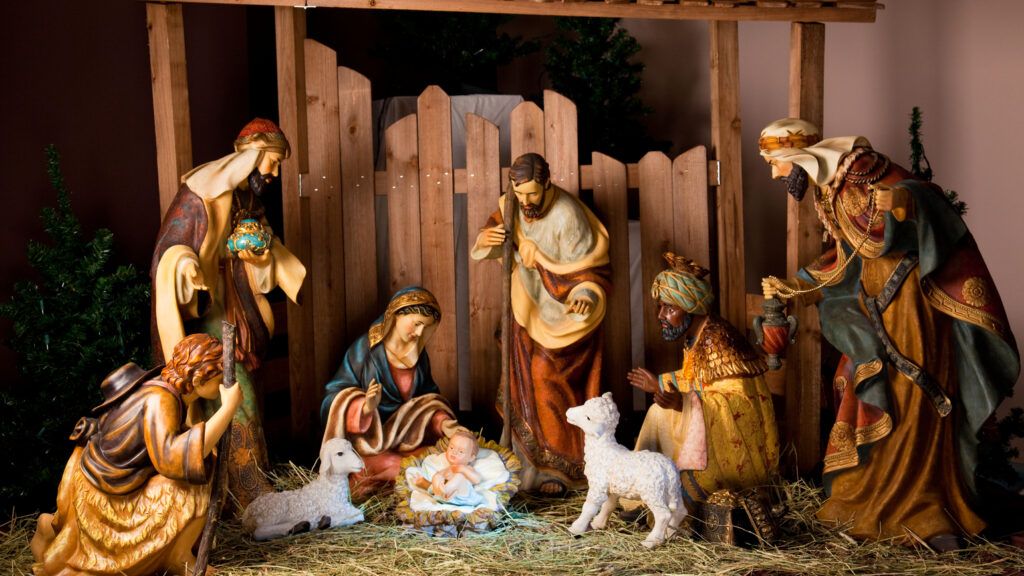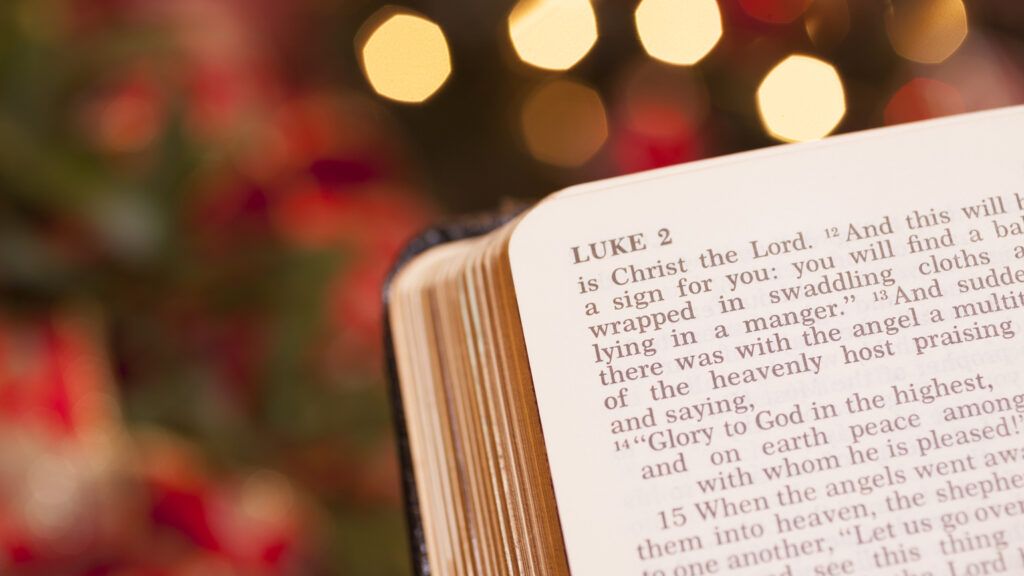What Does “Christmas” Mean?
The word “Christmas” comes from the Old English phrase Cristes mæsse which means “Christ’s Mass.” It refers to the Christian holiday that celebrates the birth of Jesus Christ. Christmas is on December 25 every year, though some denominations celebrate it on January 7.
The History of Christmas
The history of Christmas—a simple time of joy and celebration—is actually very long and complicated.
Though Christmas celebrates the birth of Jesus, which biblical scholars believe to be around 4 or 6 BC according to Britannica, the first Christmas was not celebrated until years later. Historians believe Christmas was originally celebrated in Rome around 336 BC. It did not even become a major Christian holiday until the 9th century
However, just because Christmas was better known does not mean it was always popular. According to History, Puritans viewed Christmas celebrations as anti-Christian and indulgent. Because Puritans were a major group in America, Christmas was not a popular holiday in early American history. The government of Massachusetts even banned Christmas celebrations in 1659. The Congressional Research Service states that it wasn’t even recognized as a federal holiday until 1870, when the holiday was more widely celebrated.
Christmas’ popularity in America can be traced to writer Washington Irving, perhaps best known for writing the classic Halloween short story “Sleepy Hollow.” Irving wrote extensively about Christmas and the character of Saint Nicholas (the basis of Santa Claus). He helped reshape the holiday to be one of family time, community, and giving. As he wrote in 1819 in The Sketch Book of Geoffrey Crayon, “Christmas is a season for kindling the fire for hospitality in the hall, the genial flame of charity in the heart.”
READ MORE: 20 Inspiring Christmas Quotes
This sentiment inspired people throughout America and Europe to embrace the holiday. One of them was writer Charles Dickens, who wrote the classic novel, A Christmas Carol. Another was poet Clement Clarke Moore, who wrote “A Visit from St. Nicholas,” also known by its opening line, “’Twas the night before Christmas…”
Whatever its history, Christmas is affixed in many people’s minds and calendars as one of the happiest and holiest times of year.
Why is Christmas on December 25?
The reason Christmas is now traditionally celebrated on December 25th is just as complicated as its history. While this holiday celebrates the birth of Jesus, there are conflicting opinions on if this is truly Jesus’ date of birth. The Bible does not state a specific date. There were no, or very scant, birth records during that time. For centuries, no one was certain when Jesus’ birthday fell.
In 221 CE, Sextus Julius Africanus, a Christian historian, created the first known Christian calendar of major events. According to Britannica, he used the Bible as his basis and placed Jesus’ birth at the end of December. Christian Roman emperor Constantine decreed in 336 CE that Jesus’ birth would be celebrated on December 25. And thus, Christmas’ date was decided.
Some historians also believe that Christians picked the date to coincide with Saturnalia, a Roman holiday, and by placing the festivities together, the celebration may have been used to convert many Romans to Christianity.
READ MORE: Why December Is the Perfect Time for Christmas
Christmas in the Bible
While the word “Christmas” is not in the Bible, we can find the story of Christmas, or the birth of Jesus, in various gospels within the New Testament:
Christmas in The Book of Luke
This gospel recounts the entirety of Jesus’ life, from when an angel told Mary she would conceive a child, to Jesus’ ascension to heaven. Luke 2:1-21 tells the story of the birth of Jesus, including how the shepherds “found Mary and Joseph, and the baby, who was lying in the manger.”
Christmas in The Book of John
This book is by the disciple John, beginning with those powerful words, “In the beginning was the Word, and the Word was with God, and the Word was God…” The gospel follows Jesus’ life through John’s perspective and John 1:1-14 explains the spiritual importance of Jesus’ birth.
Christmas in The Book of Matthew
The Book of Matthew traces Jesus’ lineage to Abraham and tells more of the story of His life. Matthew 1:18-25 specifically recounts Jesus’ birth, including how Joseph accepted Jesus as his son and giving Him the name Jesus.
READ MORE: A Christmas Story Told Through Bible Verses and Illustrations
Christmas Bible Verses
The spirit of Christmas lives in many other parts of Scripture. We can turn to them for inspiration on how to celebrate and give thanks during the holidays. Here are Bible verses that focus on Christmas themes, such as hope, peace, giving, community, and the glory of Jesus Christ.
- May the God of hope fill you with all joy and peace as you trust in Him, so that you may overflow with hope by the power of the Holy Spirit. —Romans 15:13
- And the peace of God, which transcends all understanding, will guard your hearts and your minds in Christ Jesus. —Philippians 4:7
- Every good and perfect gift is from above, coming down from the Father of the heavenly lights, who does not change like shifting shadows. —James 1:17
- Therefore encourage one another and build each other up, just as in fact you are doing. —1 Thessalonians 5:11
- Let the peace of Christ rule in your hearts, since as members of one body you were called to peace. And be thankful. —Colossians 3:15
READ MORE: 6 More Christmas Bible Verses to Inspire Love and Peace
What is the True Meaning of Christmas?
To go deeper into what the Christmas season means, we can turn to the words of American clergyman and author, Norman Vincent Peale:
“The gifts you receive—modest or elaborate—are important only to the degree they help you experience something of what Christmas really is. Which is what? It is a spiritual observance of the birth of Jesus Christ into the stream of history and into the soul of man.”
READ MORE: Norman Vincent Peale on the Meaning of Christmas
Could it be that gifts aren’t an important part of the meaning of Christmas? If we look at the moral at the end of Dr. Suess’ How the Grinch Stole Christmas, that appears to be the case. Even after the Grinch stole all their presents, the Whos down in Whoville still gathered around to sing together and celebrate the season. “Maybe Christmas doesn’t come from a store,” the Grinch mused. “Maybe Christmas, perhaps, means a little bit more.”
However, Peale’s wife, Ruth Stafford Peale, has another take on the tradition of giving Christmas gifts and its place within this holy season. She tells the story of a young boy who gives his teacher a gift after walking far to get it. The boy clarified that not only was the gift a present, but the lengths he went to get it were a part of the gift as well. Stafford Peale writes:
“The more the last-minute chores, surprise guests, and just-one-more-gift excursions into town piled up, the more we remembered that what seemed like petty distractions from celebrating the season were really nothing of the sort. They were its very heart.”
READ MORE: Ruth Stafford Peale on the Deeper Meaning of Christmas Gifts
Christmas Prayers
- Come, thou long expected Jesus, born to set your people free; from our fears and sins release us, let us find our rest in thee. —Charles Wesley (Methodist poet and hymnist)
- Lord Jesus, the day of your nativity approaches, the day on which we commemorate your birth, your condescension, your humble incarnation. Please help me and mine to approach that day on tiptoe, with reverence and awe, mindful of your holiness and beauty, and grateful for the privilege of finding and approaching and kneeling at your manger, amen. —Bob Hostetler (Guideposts contributor)
- Loving Father, help us remember the birth of Jesus, that we may share in the song of the angels, the gladness of the shepherds, and worship of the wise men. Close the door of hate and open the door of love all over the world. Let kindness come with every gift and good desires with every greeting. Deliver us from evil by the blessing which Christ brings, and teach us to be merry with clear hearts. May the Christmas morning make us happy to be Thy children, and Christmas evening bring us to our beds with grateful thoughts, forgiving and forgiven, for Jesus’ sake, amen. —Robert Louis Stevenson (novelist and poet)
READ MORE: 6 Short Prayers for Christmas Eve and Christmas Day










